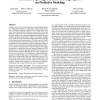Free Online Productivity Tools
i2Speak
i2Symbol
i2OCR
iTex2Img
iWeb2Print
iWeb2Shot
i2Type
iPdf2Split
iPdf2Merge
i2Bopomofo
i2Arabic
i2Style
i2Image
i2PDF
iLatex2Rtf
Sci2ools
149
click to vote
ASPLOS
2006
ACM
2006
ACM
Efficiently exploring architectural design spaces via predictive modeling
Architects use cycle-by-cycle simulation to evaluate design choices and understand tradeoffs and interactions among design parameters. Efficiently exploring exponential-size design spaces with many interacting parameters remains an open problem: the sheer number of experiments renders detailed simulation intractable. We attack this problem via an automated approach that builds accurate, confident predictive design-space models. We simulate sampled points, using the results to teach our models the function describing relationships among design parameters. The models produce highly accurate performance estimates for other points in the space, can be queried to predict performance impacts of architectural changes, and are very fast compared to simulation, enabling efficient discovery of tradeoffs among parameters in different regions. We validate our approach via sensitivity studies on memory hierarchy and CPU design spaces: our models generally predict IPC with only 1-2% error and reduc...
Related Content
| Added | 20 Aug 2010 |
| Updated | 20 Aug 2010 |
| Type | Conference |
| Year | 2006 |
| Where | ASPLOS |
| Authors | Engin Ipek, Sally A. McKee, Rich Caruana, Bronis R. de Supinski, Martin Schulz |
Comments (0)

